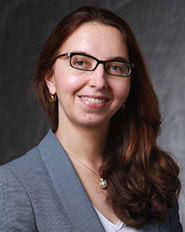Series to Highlight Women in Signal Processing: Dr. Birsen Yazici

 Dr. Birsen Yazici received her B.S. degrees in electrical engineering and mathematics from Bogazici University, Istanbul Turkey, in 1988, and the M.S.and Ph.D.degrees in mathematics and electrical engineering from Purdue University, West Lafayette, IN, USA, in 1990 and 1994, respectively. From September 1994 to 2000, she worked as a Research Engineer at General Electric Company Global Research Center, Schenectady NY, USA.
Dr. Birsen Yazici received her B.S. degrees in electrical engineering and mathematics from Bogazici University, Istanbul Turkey, in 1988, and the M.S.and Ph.D.degrees in mathematics and electrical engineering from Purdue University, West Lafayette, IN, USA, in 1990 and 1994, respectively. From September 1994 to 2000, she worked as a Research Engineer at General Electric Company Global Research Center, Schenectady NY, USA.
During her tenure in the industry, she worked on radar, transportation, industrial and medical imaging systems. From 2001 to June 2003, Dr. Birsen was an Assistant Professor with the Department of Electrical and Computer Engineering, Drexel University. In Fall 2003, she joined Rensselaer Polytechnic Institute where she is currently a Full Professor with the Department of Electrical, Computer and Systems Engineering.
Dr. Yazici's research interests include computational imaging, machine learning, image reconstruction, radar, and sonar. She has served as an associate editor for IEEE Transactions on image processing, IEEE Transactions on geosciences and remote sensing and SIAM Journal on Imaging Science in the past. Currently, she serves as an associate editor for IEEE Transactions on Computational Imaging. Dr. Yazic holds 11 U.S. patents.
We approached Dr. Yazici with a few questions:
Q. Why did you become a professor of electrical and computer engineering?
I cannot think of any other profession, but one about teaching and research. I enjoy teaching what I know to young people and feel proud to see them excel in their field.
Q. How does your work affect society?
I educate and collaborate with undergraduates and graduate students in computational imaging in the broad domains of defense, medical, civil engineering, geophysical applications. My graduate students typically pursue careers in defense, energy and health care industries.
Q. What challenges you had to face to get where you are today?
At the time I started my academic career, there were very few women faculty in electrical and computer engineering departments. For example, my own institution did not have a tenured woman faculty despite being the oldest electrical engineering department in the country. There was no formal or informal mentorship of new faculty to navigate through the tenure process. Without any bearing, I was in an exhausting race with myself. It was a learning process for me and my colleagues in my department. As the number of women faculty increased, clear pathways and mentorship and networking support have been established. We have now several very successful women faculty in our department.
Q. What advice would you give to scientists/engineers in signal processing?
Have an interdisciplinary education, not only in signal processing and mathematics but also in your domain of application. You will get smarter and produce better solutions.

